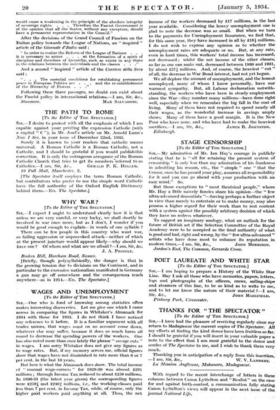WAGES AND UNEMPLOYMENT
[To the Editor of THE SPECTATOR.] SIR,—One who is fond of browsing among statistics often makes interesting discoveries. Let me give one which I came across in comparing the figures in Whitaker's Almanack for 1934 with those for 1933. I do not think I have noticed any reference to it before. It is a familiar argument with all trades unions, that wages must on no account come (Iona:, whatever else may suffer, because it does so much harm all round to decrease the spending powers of the workers. One has also noted more than once lately the phrase "savage cuts" in wages. I am sorry Whitaker does not give any figures as to wage rates. But, if my memory serves me, official figures show that wages have not diminished in rate more than 6 or 7 per cent, in the last 10 years.
But here is what the Almanack does show. The total income of "manual wage-earners" for 1929-30 was almost £291 millions ; through Income Tax reduced to about £258 millions. In 1930-81 (the latest year given) the corresponding figures were 0581 and £2401 millions, i.e., the working-classes paid less than 7 per cent. in Income Tax, while, of course, only the. higher paid workers paid anything at all. Thus, the net income of the workers decreased by 217 millions, in the last year available. Considering the heavy unemployment one is glad to note the decrease was so small. But when we turn to the payments for Unemployment Insurance, we find that, for this same year, they have increased in all by £181.millions I do not wish to express any opinion as to whether the unemployment rates are adequate or no. But, at any rate, even in hard times, this workers' total income has increased, not decreased ; whilst the net income of the other classes, so far as one can make out, decreased between 1980 and 1981, by about F.57! millions. And, of course, the heaviest " cut " of all, the decrease in War Bond interest, had not yet begun.
We all deplore the amount of unemployment, and the honest unemployed, many of whom I know personally, have our warmest sympathy. But, all Labour declamation notwith- standing, the workers who have been in steady employment since the War—they number many millions—have done right well, especially when we remember the big fall in the cost of living. Many of them have not required to spend nearly all their wages, as the wonderful increase in savings amply shows. Many of them have a good margin. It is the New Poor who have none, and who have had to make the heaviest






































 Previous page
Previous page